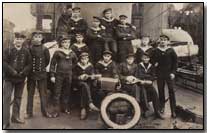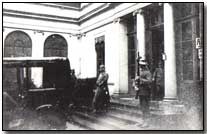 In September 1918 Germany's Supreme Command realised that their country was on it last legs and decided to sue for peace and, in order to gain more favourable terms, set up a constitutional monarchy.
In September 1918 Germany's Supreme Command realised that their country was on it last legs and decided to sue for peace and, in order to gain more favourable terms, set up a constitutional monarchy.
General Ludendorff was replaced by GeneralWilhelm Groener and Prince Max von Badenbecame Imperial Chancellor. But while the Supreme Command worried itself over thearmistice terms, the German people seethed with indignation – millions had been sent to the grave for nothing. The hostility was further heightened by stringent rationing that was now leading to starvation.
With the war lost, the socialists in German society saw a chance to manoeuvre into power. The SPD (the majority socialists), were the largest party with the greatest support in Germany – their socialism was calm and methodical.
They were fronted by Fredrich Ebert, a podgy man with a gruff expression. He was an excellent organiser and was capaPublish Postble of taking decisive actions. Gustav Noske was to become his right-hand man. Tall and thickly built, Noske was a good speaker, with the ability of getting his enemies to bend to his will through words alone. But Noske was also ruthless enough to use violence to obtain his goals.
 As the days wore on, the situation in Berlin and the country worsened. In early November, the sailors of the High Seas fleet at Kiel had revolted, although they were calmed by the brilliant realpolitik of Noske who had been especially sent to tame the mutiny.
As the days wore on, the situation in Berlin and the country worsened. In early November, the sailors of the High Seas fleet at Kiel had revolted, although they were calmed by the brilliant realpolitik of Noske who had been especially sent to tame the mutiny.
Many of the sailors, however, upped sticks and headed either to other major ports or to the capital. Of the latter, a large group numbering around 3,000 took over the Imperial Palace – the Schloss – and the imposing Imperial stables – the Marstall. They named themselves the People's Naval Division. Other destabilising elements were in Berlin and other cities: army deserters roamed the streets alongside communists, anarchists and criminal gangs.
Despite the growing chaos, the SPD had initially attempted to work with Prince Max von Baden's government. Unfortunately, Max von Baden's attempts to secure the Kaiser's abdication were painstakingly slow and when he did finally receive confirmation thatthe Emperor was stepping down, it was too late.
Massed protests and strikes against the government and the monarchy were sweeping the nation, particularly in Berlin. The SPD, now fearful of losing popular support, withdrew from von Baden's government, leaving him no choice but to hand over power and the Chancellorship to them on 9 November.
 That evening, one of Ebert's colleagues,Philip Scheidemann, announced the foundation of the German Republic to protesters gathered below a set of French windows at the Reichstag.
That evening, one of Ebert's colleagues,Philip Scheidemann, announced the foundation of the German Republic to protesters gathered below a set of French windows at the Reichstag.
Ebert was livid – how could he be an Imperial Chancellor of a Republic? Fortunately, constitutional complexities were far from the minds of most Germans. The new Chancellor's main tasks were to secure the armistice, maintain power and then to gain a democratic mandate through elections. He faced many enemies and, ironically, the greatest threat was not from the right, but from the left.




No comments:
Post a Comment
Thank You For Your Valuable Comments